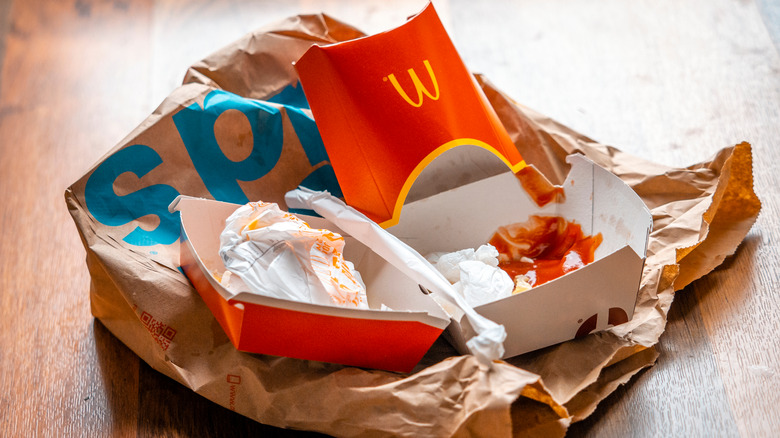This Scary Ingredient May Be Lurking In Your Burger Wrapper
With all the fat, sugar, and calories that it contains, it's no wonder that fast food has such a dire reputation (via National Center for Health Research). Sure, it tastes especially nice after a few drinks, but those greasy cravings strike terror through every internal component of our bodies.
There's also the packaging to consider. In these times of awareness, it is no longer acceptable to play around with plastic, pretending it to be harmless. Every decision that is made must consider the environmental impacts. You may well survive another sauce-splattered hamburger, but how will an Antarctic penguin feel when it has to wear the cardboard box as a hat?
As harmful as excessive and dangerous packaging may be to the planet, research suggests that humans may end up being affected by fast food packaging, too. ACS Publications notes that many of the wrappers and cartons used to transport junk food are laced with chemicals called per- or polyfluoroalkyl substances (PFASs), which have been associated with an increased risk of cancer and other health problems.
Major food companies are using PFASs in their packaging
PFASs are used by the food industry to make packaging resistant to water and grease, but these chemicals are believed to negatively impact the immune system. They have also been linked to polluted drinking water (via Safer Chemicals, Healthy Families). In fact, PFASs have earned the nickname "forever chemicals" because they are incredibly difficult to break down, according to the National Institute of Environmental Health Sciences (NIH).
NIH also confirms that a key component of a PFAS is fluorine. An investigation by ACS Publications discovered that fluorine was present in 56% of dessert and bread wrappers, 38% of sandwich and burger wrappers, and 20% of paperboard. Furthermore, findings reported by Safer Chemicals, Healthy Families found that tests of packaging used by McDonald's, Burger King, and Wendy's revealed some high levels of fluorine, suggesting the use of PFASs.
Although the FDA allows a specific number of PFASs to be used in food packaging, processing equipment, and cookware, responsible agencies elsewhere have taken stricter action. In Denmark, all PFASs have been banned from being used in food packaging due to the risks the chemicals are believed to pose to humans and the environment (via Chemistry World).

